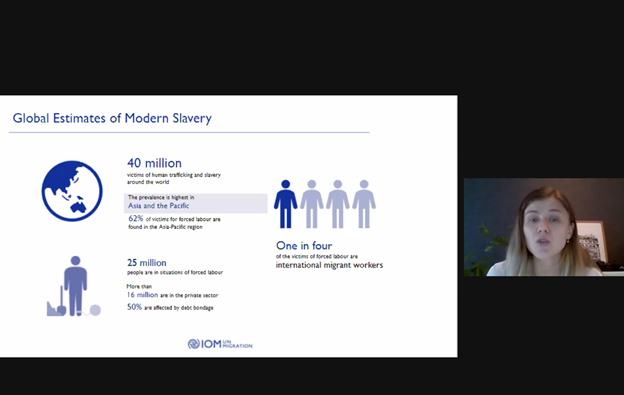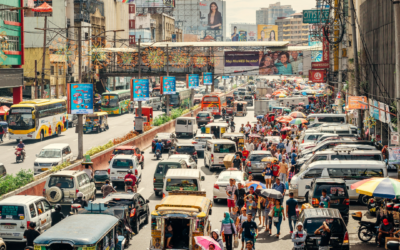Anti-slavery movement leaders across Asia convened virtually via Zoom in August at the first-ever Freedom from Slavery Forum – Asia to discuss issues most pertinent to the continent and set priorities for next year around the theme of “Resilience and Resistance to Modern Slavery: Key Priorities for Asia.”
Each day’s programming centered around a different theme, starting with local issues and increasingly zooming out to global ones.
- Day one focused on “How COVID-19 has impacted resilience to modern slavery in Asian communities.”
- Day two centered around “Strengthening Asia’s anti-slavery efforts while engaging survivors.”
- Day three closed by looking outward to the global movement around the theme of “Beyond Asia: Threats and solutions beyond the continent.”
DAY ONE
Day 1’s sessions contemplated “How COVID-19 has impacted resilience to modern slavery in Asian communities.” With COVID-19 exacerbating root causes of human trafficking and modern slavery, especially disrupting education as well as local and global economies, it was pertinent for participants to discuss the newfound conditions they have been working in, learn from experts about opportunities for resiliency and solutions, and share their experiences with others working in their local contexts.
During her keynote address, Anastasia Vynnychenko, Project Manager at the International Organization on Migration (IOM), spoke on the intersection between human mobility and sustainable development, with emphasis on the effect of COVID-19.

A presentation followed by Shariful Hasan an activist and journalist dedicated to the migration sector. In his capacity as head of the BRAC Migration Program, he introduced a tragic story of recent events in Bangladesh, discussing the prevalence of slavery in Asia, and highlighting BRAC’s response: poverty alleviation, identification of victims, etc.
A discussion followed among five esteemed panelists: Tandin Wangmo, national project coordinator at the UNODC; Noel Eballe, senior lead for policy and advocacy at IJM Philippines; Loan Luong, program director at the Pacific Links Foundation; Rajiv Sinha, programs manager, Srijan Foundation; and Bishwo Khadka, executive director of Mait. They ruminated on the questions of: “How has the COVID-19 pandemic impacted resilience to modern slavery?” and “How has your organization’s strategy to address modern slavery changed as a result of the COVID-19 pandemic? What solutions have been identified?”
Participants were then split into three groups to explore specific vulnerabilities they face in their work and how COVID-19 has impacted them. These groups were led by: Maqbool Khokhar, CEO of the Christian Care Foundation; Dr. Pratibha Singh, director of Emmanuel Hospital Association (EHA); and Kranti Tamang, executive director of the Shanti Foundation.
DAY TWO
While Day 1 of the Forum focused on local issues and priorities, programming on Day 2 zoomed out slightly to the regional level. Sessions focused on “Strengthening Asia’s anti-slavery efforts while engaging survivors.” Topics for discussion throughout the day included survivor-led programming and advocacy, regional and national anti-slavery policies, and partnership building. Participants heard from survivors and those interacting closely with survivors from throughout the region. The Forum was deliberate in weaving survivor engagement with policy discussions, reinforcing the interconnectedness of these topics.
To begin the day, participants heard from Angela Guanzon, a survivor, activist, advisory council member of HEAL Trafficking, and committee chair of Resilient Voices-CAST LA Survivor Network. She recounted her experiences with modern slavery and shared her insights on what the movement needs to prioritize, setting the tone for the rest of the day’s sessions.
Following the keynote address, Skye Maconachie, co-CEO of Blue Dragon Children’s Foundation presented on Blue Dragon’s efforts to combat modern slavery. Blue Dragon engages in survivor-led, trauma-informed support. They also provide training to law enforcement, rely on a peer support model where survivors work with staff, and organize activities.
Following the presentation, Professor Babu Mathews from the National Law School of India, moderated a panel discussion where CSO leaders working in the anti-trafficking space were able to share their experiences interacting with survivors, especially how to ensure survivor voices and needs are incorporated into their work. Panelists included: Huong Dang, founder and CEO of Hopebox; Bhanuja Sharan Lal, executive director of MSEMVS; Bartimeues van Oost, managing director of CURE Foundation; and Binoy Krishna Mallick, executive director of Rights Jessore.
After hearing from survivors and best practices for engaging with them, participants split into smaller workshops by region to discuss how they have incorporated survivor engagement and survivor-led programming and advocacy into their work and to learn from their peers about how to do so more effectively in the future. This session allowed participants to become more aware of the value survivors can bring to their work, and how to engage them meaningfully, respectfully, and without tokenism.
The regional discussion leads for these workshops included: Angela Escobilla, project manager of the Balay Mindanaw Foundation; Reann C. Mantilla, manager of JPI – IDC; and, Sudha Upadhyayula, head of operations at My Choices Foundation.

DAY THREE
Day 3 built upon the programming of the first two days to focus on global threats and connecting anti-slavery work being done in Asia with the global movement around the theme of: “Beyond Asia: Threats and solutions beyond the continent.” Programming focused on global-scale issues including migration, conflict, technology, as well as on connecting the Asian priorities to the global movement.
Archana Kotecha, CEO of the Remedy Project, utilized her keynote address to speak about the weakness of the anti-modern slavery movement, especially with regard to how fragmented and siloed it is. She spoke on U.N. sustainable development goal (SDG) 8, which is about inclusivity and sustainable economic growth. She highlighted the inherent ownership and responsibility that everyone involved in the movement has over the outcome of its actions.
The final set of presentations during the Forum was moderated by Carol Mortensen, executive director of Hagar International. These presentations centered around global factors that exacerbate modern slavery, such as, migration, technology, and a global economy, and highlighted areas for movement response.
The first presenter was Purva Gupta, global coordinator of Global March, and she spoke on child labor as a growing pandemic in tandem with COVID-19. Next, Cecilia Oebanda-Pacis, founder of Voice of the Free, highlighted the plight of migrant workers from the Philippines. She shared how Voice of the Free is investing in innovative and technological solutions to the pervasive issue. The third presenter was Cheryl Perera, executive director of One Child. She introduced her organization and emphasized the importance of including children and promoting a movement that is led by youth. Then, Borislav Gerasimov, program coordinator communications and advocacy and editor of the Anti-Trafficking Review at the Global Alliance Against Traffic in Women, spoke on the effects of neoliberalism, climate change, and digitalization, especially on the erosion of labor rights and factors that are pushing people to migrate for salaried work. Matt Friedman, CEO of The Mekong Club, stressed the importance and relevance of the private sector in the fight to end modern slavery. Angharad Smith, program officer at the United Nations University-Center for Policy Research and representative of Delta 8.7, shared information about the collaborative research project Delta 8.7 undertook to create a series of policy guides. Finally, Carol Mortensen, executive director of Hagar International, shared about the work her organization does to thwart human trafficking and modern slavery.
The final workshop of the Forum was dedicated to cultivating a list of regional priorities that would be discussed at the global convening occurring in Marrakesh, Morocco from December 6-8, 2021. In this interactive session, participants were able to reflect on how other regional movements and Alliance 8.7 intersect with Asia and the ways in which they can work together to end modern slavery globally.
Learn more about the Freedom from Slavery Forum here.



